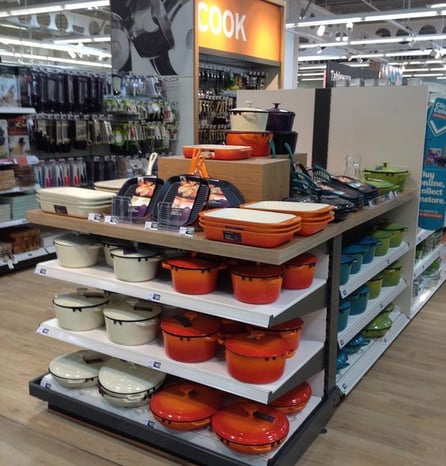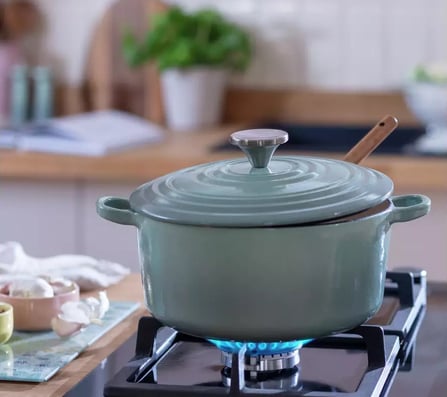Elevate your cooking experience with our high-quality and innovative kitchen accessories.
Cookware Series
Cast iron cookware has been around for centuries and remains a popular choice among professional chefs and home cooks alike. It is known for its durability, heat retention, and versatility in the kitchen.
What is Cast Iron Cookware?
Cast iron cookware is made by pouring molten iron into sand molds, creating robust and heavy-duty cooking tools. The main advantage of cast iron is its exceptional heat retention, which allows for even cooking and searing.
Benefits of Cast Iron Cookware
Durability: Cast iron cookware is built to last a lifetime, making it a great investment for your kitchen.
Heat Retention: Cast iron retains heat well, allowing for even cooking and keeping your food warm for longer periods.
Versatility: Cast iron cookware can be used on the stovetop, in the oven, or even on an open flame, making it a versatile tool for any cooking method.
Non-stick Properties: When properly seasoned, cast iron cookware forms a natural non-stick surface, making it ideal for cooking delicate foods.
Seasoning and Care
Seasoning: refers to the process of treating cast iron cookware to form a natural non-stick surface and protect it from rust. To season your cast iron, start by applying a thin layer of oil or fat to the surface, then heat it at a high temperature for some time.
Cleaning: Avoid using soap or harsh chemicals. Instead, use a brush or non-abrasive sponge with hot water to remove any food residue. Dry the cookware thoroughly to prevent rusting.
Common Uses of Cast Iron Cookware
Searing and Grilling: Cast iron pans are excellent for achieving a beautiful sear on meats and vegetables, locking in flavor and moisture.
Baking: Cast iron skillets and Dutch ovens are perfect for baking bread, pies, and other delicious treats, providing even heat distribution.
Frying: The depth and heat retention of cast iron makes it an ideal choice for deep frying.
Tips and Tricks
Preheat your cast iron cookware before use to ensure even cooking.
Use wooden or silicone utensils to avoid scratching the seasoning.
Avoid acidic foods or prolonged simmering, as they can degrade the seasoning.
Store your cast iron cookware in a dry place to prevent rust.
Gourmet Fondue Series
A gourmet fondue set is a specialized tool for making and serving fondue. It typically includes several key components:
Fondue Pot: Made from heat-resistant materials like ceramic, cast iron, or stainless steel, this pot is designed for melting cheese or other ingredients. It often has a handle, a lid, and sits on a stand with a built-in heater or burner to keep the fondue warm. Some sets offer adjustable heat settings.
Fondue Forks or Skewers: These long utensils, with heat-resistant handles and two or three prongs, are used to dip foods into the melted fondue. They allow multiple people to enjoy the fondue simultaneously.
Additional Accessories: Some sets include a fuel holder or capsules, a splatter guard, or a rotating base for easy sharing.
When choosing a fondue set, consider the pot's material, size, design, and heat source. Quality forks or skewers are also important. Gourmet fondue sets are versatile and can be used for cheese, chocolate, or oil-based fondues.
Cheese Fondue Series
Cheese fondue is a delicious dish that involves melting various types of cheese and serving it as a dipping sauce. The dish originated in Switzerland and is now popular in many parts of the world.
To make cheese fondue, you typically start by selecting a combination of cheeses that melt well, such as Swiss, Gruyere, or Emmental. These cheeses are then grated or cubed and mixed with other ingredients like garlic, wine, lemon juice, and sometimes a bit of flour or cornstarch to help thicken the fondue.
Once the cheese mixture is prepared, it is traditionally melted in a fondue pot over a low flame or heat source. The pot is typically placed in the center of the table, allowing everyone to gather around and dip their food into the molten cheese.
Cheese fondue is commonly enjoyed with a variety of accompaniments, such as cubed bread, vegetables, fruits, or even meats. Each guest uses a long skewer or fork to dip their chosen food into the pot, coating it with the warm, gooey cheese. The melted cheese offers a rich and savory flavor that complements the different dippers.
Cheese fondue is not only a tasty dish, but it also provides a fun and interactive dining experience, making it popular for gatherings and social events. It's a great way to enjoy a communal meal where everyone can participate in the cooking process.
Chocolate Fondue Series
Chocolate fondue is a delicious dessert that involves dipping various foods into melted chocolate. The word "fondue" comes from the French word "fondre," which means "to melt." In a chocolate fondue, typically, a mixture of chocolate and cream or milk is melted and kept warm in a pot or fondue fountain.
Chocolate fondue is usually served as a communal dish, with everyone gathering around the pot or fountain and dipping a variety of bite-sized treats into the melted chocolate. Some popular items for dipping include fresh fruit such as strawberries, bananas, and pineapple chunks. Other options can include marshmallows, pretzels, cookies, pound cake, or even pieces of cheesecake.
The process of making chocolate fondue is relatively simple. First, you need to melt the chocolate with cream or milk, either on the stovetop or using a microwave, until it reaches a smooth and silky consistency. Then, you transfer the melted chocolate to a fondue pot or fountain to keep it warm while serving.
To enjoy chocolate fondue, each person takes a skewer or a long fork and dips their chosen food item into the warm melted chocolate. After a quick dip, the food is lifted out and allowed to cool briefly before being consumed. It's a fun and interactive dessert that can be enjoyed at parties, gatherings, or even as a romantic treat for two.
Grilling & Raclette Series
Grilling is a cooking method where food is cooked over direct heat, usually on a grill or a grill pan. It typically involves placing the food (such as meat, vegetables, or seafood) directly on the heat source or on a grate. Grilling gives food a smoky flavor and creates distinct grill marks.
Raclette, on the other hand, is a type of cheese and a popular Swiss dish. It is also the name of a traditional Swiss meal that centers around the cheese. In a raclette meal, a wheel of Raclette cheese is placed in front of a heat source and slowly heated. As the cheese melts, it is scraped onto plates and enjoyed with boiled potatoes, pickles, onions, and sometimes cured meats. It is a social and interactive meal where everyone can customize their plate with melted cheese and accompaniments.
Both grilling and raclette offer unique and delicious ways to enjoy food, whether it's cooking meat over an open flame or indulging in melted cheese with various toppings and sides.












